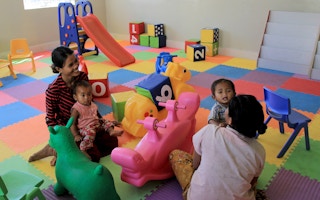Aid cuts could put more women and girls at risk of domestic violence, unsafe abortions and dropping out of school as rich nations’ spending to fight gender inequality stagnates for the first time in a decade, charities and policy experts say.
Countries such as Britain, the Netherlands and Japan pledged less money to tackle gender violence in 2020/21, and committed a smaller share of total aid to gender equality programmes for the first time since 2010, a new report by the Organisation for Economic Co-operation and Development (OECD) shows.
As major donors such as Sweden and Germany reassess their aid spending, campaigners are warning of the potential consequences.
“When gender equality funding is reduced, there are real-life implications on the provision of health services, particularly, sexual and reproductive health,” said Foteini Papagioti, senior policy advisor at the US-based International Center for Research on Women (ICRW).
“So that will very likely affect women and girls in some of the poorest countries around the world,” Papagioti told Context.
According to the OECD report, the share of total overseas development aid dedicated to gender equality-related programmes slipped to 44 per cent in 2020/21 from 44.5 per cent in 2018/19 after 10 consecutive years of growth.
And in 2020/21, rich nations including Canada, Norway and Germany committed less money to tackle gender violence, pledging US$458 million compared with US$531 million in 2018/19, the data showed.
Papagioti warned that the downward trend was likely to continue for the next two or three years given that several countries, including Britain, have decreased their foreign aid budgets due to fallout from the Covid-19 pandemic and the Ukraine war.
“
This is obviously at the bottom of people’s lists. Because there’s just so many other things worth spending money on. Governments are shifting their priorities in that sense, and that shows in the money flows.
Lyric Thompson, founder, Feminist Foreign Policy Collaborative
Sweden, which spent 57.4 billion Swedish crowns (US$5.25 billion) on overseas aid in 2022, said in February it would allocate an annual aid budget of 56 billion crowns until 2025.
Germany, which is the world’s second-biggest donor after the United States, is also considering reductions to its overseas humanitarian budget.
British aid cuts
The potential cutbacks from major donors came after Britain reduced its overseas aid in 2020 to 0.5 per cent gross national income (GNI) - down from the UN target of 0.7 per cent of GNI - to free up cash for domestic spending during the pandemic.
An official assessment published by UK lawmakers earlier this month found that thousands of women and girls - from Afghanistan, Yemen and across Africa - would not receive critical healthcare, education and access to safe abortions as a result of the cuts.
Monica Ferro, head of the UK office of UNFPA, the UN reproductive and sexual health agency, acknowledged the budget challenges facing donor governments but said funding for gender equality programmes was “life-saving”.
“This is why we have to keep on highlighting the needs of women and girls - their needs are intensified by these crises,” Ferro said.
UNFPA said the 150 million pounds (US$190.8 million) that Britain cut from the agency’s progammes in 2021/22 could have prevented 47 million unintended pregnancies, 813,000 maternal and child deaths and 14.4 million unsafe abortions.
Britain is the agency’s fourth-largest donor and the leading funder of the UNFPA Supplies Partnership, the world’s largest provider of donated contraceptives, the group said.
The International Planned Parenthood Federation (IPPF), a global reproductive health charity, said in an email that Britain had cut its funding by 50 per cent this year, an amount equivalent to more than 10 million pounds.
Spending aid at home
Some of the cutbacks on gender programmes have also been explained by the rising domestic cost of hosting refugees and asylum seekers, for example, Ukrainians fleeing Russia’s invasion or Afghans leaving their homes due to the Taliban’s takeover.
Total foreign aid rose to a record US$204 billion in 2022 from US$186 billion in 2021 because of the rising refugee-related costs, according to 2023 OECD data.
Rich countries spent US$29.3 billion on “in-donor” refugee costs, US$7 billion more than what was spent on humanitarian aid, the report said.
Last year, Britain used a third of its aid budget - about 3.7 billion pounds (US$4.6 billion) - to host refugees, most of them Ukrainian, official data showed, drawing widespread criticism from lawmakers, aid watchdogs and charities.
“In a political sense, when there are people coming on boats at your door, it’s hard to justify the spend overseas,” said Lyric Thompson, founder of the US-based think-tank Feminist Foreign Policy Collaborative.
Thompson said she was worried aid money that should be spent on overseas gender equality programmes could increasingly be redirected to cover the costs of hosting refugees at home.
“This is obviously at the bottom of people’s lists. Because there’s just so many other things worth spending money on. Governments are shifting their priorities in that sense, and that shows in the money flows.”
This story was published with permission from Thomson Reuters Foundation, the charitable arm of Thomson Reuters, that covers humanitarian news, climate change, resilience, women’s rights, trafficking and property rights. Visit https://www.context.news/.










